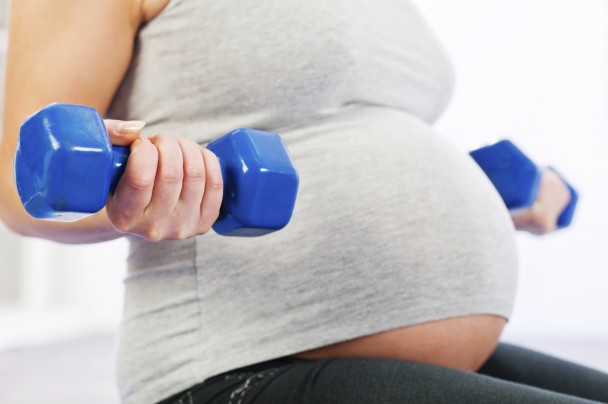
Benefits of Exercising while Pregnant
Leave a CommentWhile exercise may feel like the last thing you want to do while pregnant, there are many benefits that may make it worth your while. Exercise can benefit the mother to be in the following ways:
- Improving quality of sleep. When pregnant, it is often difficult for women to fall asleep and stay asleep. Exercising can burn off excess energy and improve the quality of sleep as long as it is not performed too close to bedtime.
- Preventing pain and reducing muscle cramps. Stretching can decrease muscle cramps in the legs. Strengthening exercises especially those for the abdominals and hip musculature can help to decrease or prevent the low back and sacroiliac joint pain that plagues many women especially in the later stages of pregnancy.
- Preparing the body for childbirth, which can lead to an easier delivery. Labor is like running a marathon. Exercise can make delivery easier by strengthening abdominal musculature and increasing endurance. Some studies have shown that active labor in exercising moms-to-be can be up to two hours shorter than non-exercising moms.

- Reducing stress and improving mood. Exercise releases endorphins, which are feel good chemicals that can give you a natural high. Exercise can therefore improve your mood and decrease anxiety during pregnancy.
- Improving self-image. Watching the scale reach numbers that you have never seen before can be difficult. Exercise can decrease the likelihood of excessive weight gain and help you feel better about yourself throughout pregnancy.
- Allowing to get that pre-baby body back faster after childbirth. Maintaining strength and muscle tone throughout pregnancy will help the body bounce back faster after giving birth.
- Reducing pregnancy constipation. Exercise can improve bowel function and reduce the discomfort of pregnancy-related constipation.
- Helping to prevent gestational diabetes and pregnancy-related hypertension/preeclampsia. Exercising can lower your risk of developing gestational diabetes by as much as 27 percent. High blood sugar during pregnancy raises the risk of preterm delivery and high birth weight babies. In addition, exercising can prevent or delay the need for medication in those already diagnosed with gestational diabetes. Exercising can also lower the risk of preeclampsia, which consists of high blood pressure and protein in the urine, which is the number one cause of premature birth.
- Improving the immune system. Moderate exercise has been shown to lower the risk of getting a cold by as much as 50 percent. It is thought that this data applies during pregnancy as well.
- Decreasing morning sickness. While exercising while nauseous may not sound appealing, many moms-to-be report less nausea during and following exercise.
- Decreasing swelling of the legs. During pregnancy the body retains more fluid and there is increased pressure on the veins, which can cause swelling of the legs in particular. Exercise can improve blood flow and decrease the amount of swelling in the legs and feet.
Before beginning or continuing exercise during pregnancy, discuss your plan with your physician or midwife to ensure that exercising is safe for you and your baby. To maximize the benefits, prenatal exercise should include weight -bearing aerobic exercise, core strengthening, and stretching. If you need assistance developing an exercise program for your pregnancy, consult with a qualified healthcare or fitness professional who has experience working with pregnant women.
The Athletico blog is an educational resource written by Athletico employees. Athletico bloggers are licensed professionals who abide by the code of ethics outlined by their respective professional associations. The content published in blog posts represents the opinion of the individual author based on their expertise and experience. The content provided in this blog is for informational purposes only, does not constitute medical advice and should not be relied on for making personal health decisions.

